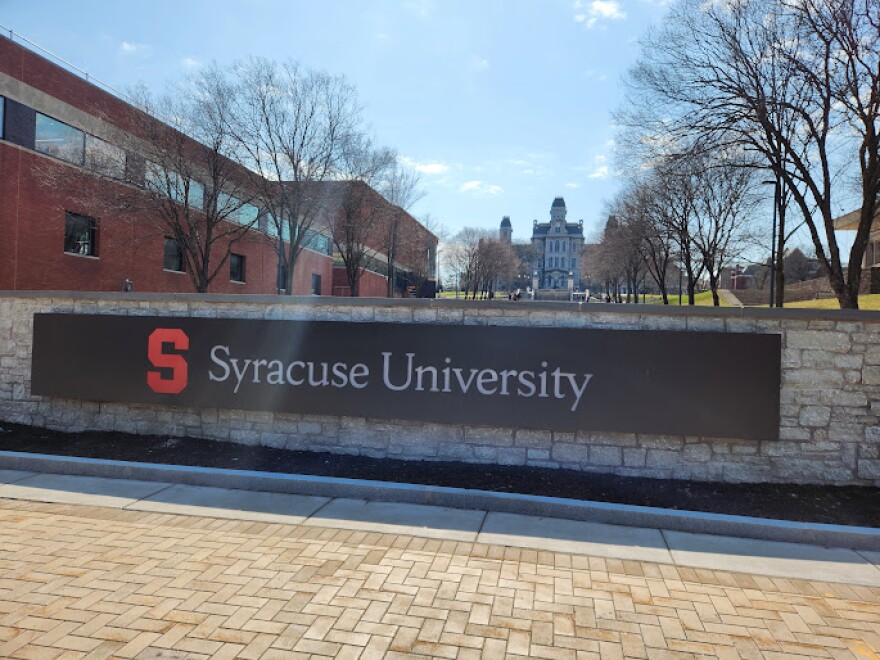As fallout continues following a congressional hearing last week on antisemitism at college campuses, Gov. Kathy Hochul sent a letter to colleges and universities across the state that said calls for genocide made on college campuses are a violation of New York State Human Rights Law and Title VI of the Civil Rights Act of 1964.
Hochul spoke about protecting students from a hostile environment at Shabbat Services at Temple Israel Friday.
"I have the support of Chancellor John King who represents all the SUNY campuses, he speaks with one voice with the moral clarity that's required," Hochul said. "I just got off the phone with him and we reaffirmed that if asked that question that was posed in Congress yesterday, that the answer in New York state would be 'yes.'"
"We know that would violate not just the code of conduct, but the code of humanity," Hochul continued.
Central New York universities are responding. Cornell University President Martha Pollack said the university condemns calls for genocide of any people saying "An explicit call for genocide, to kill all members of a group of people, would be a violation of our policies." A Cornell student was arrested in late October for allegedly making violent and antisemitic threats against the university's Jewish community.
Syracuse University Chancellor Kent Syverud said advocating for the genocide of Jews violates the university's code of conduct.
He said they should expect more of the members of the campus community regardless of what the First Amendment might permit for hateful speech and conduct.
"We should expect that our community members will refuse to advocate for the death of a group of people based on their identity," Syverud said.
The governor said any schools in the state found not in compliance with federal and state laws protecting students from discrimination could be deemed ineligible to receive state and federal funds.
Read Pollack's full statement:
Over the past few days, a number of universities, including Cornell, have been asked by members of Congress to make clear their policies around genocide. Genocide is abhorrent, and Cornell condemns calls for the genocide of any people. An explicit call for genocide, to kill all members of a group of people, would be a violation of our policies.
Martha E. Pollack
President
Read Syverud's full statement:
Dear Members of the Syracuse University Community:
Over the weekend, I received formal letters from several elected officials, including members of Congress and Gov. Kathy Hochul, asking me to consider, and in some cases respond to this question: Would advocating for the genocide of Jews violate Syracuse University’s codes of conduct? The answer is yes.
To our whole Orange community—our students, faculty, staff, alumni, families, and friends—I want to explain why.
If anyone advocates for the genocide of Israelis or Jews, or any other group—including Palestinians, Arabs, or Muslims—the targeted group has good reason to question whether that individual can faithfully meet their responsibility to all members of our community. That responsibility includes caring about the safety and well-being of all who are Orange.
Advocacy for the genocide of a group based on religion, nationality, ethnicity, or race requires Syracuse University to investigate and impose appropriate accountability. The University has disciplinary processes to address such violations of our standards. Those processes and outcomes comply with federal and state law.
But this is much more than a matter of law. It is a moral issue. As Chancellor, I have a fundamental obligation to the well-being of all our students, faculty, and staff. Regardless of what the First Amendment might permit in terms of hateful speech and conduct, as a private institution we should sometimes expect more of the members of our university community. We should expect that our community members will refuse to advocate for the death of a group of people based on their identity.
I wish the answers to all questions raised by recent events were this clear to me. During this stressful time, many are gravely concerned about the war. And I am acutely aware there remain concerns for free speech and academic freedom, including a fear that events in the world and at universities will lead administrators to regulate a broad range of speech in the name of student safety. I believe these are valid concerns, which we need to continue to work through as a community. In particular, I believe the time is here for our university to articulate a shared statement on free speech and academic freedom.
Honoring our responsibilities as citizens of this University has been stressful for so many of you since Oct. 7. Almost to a person, our community has been remarkably responsible and compassionate toward others. Thank you. I ask that we do our best to continue this, extending respect, empathy, and grace to each other in the time ahead.
Sincerely,
Chancellor Kent Syverud








